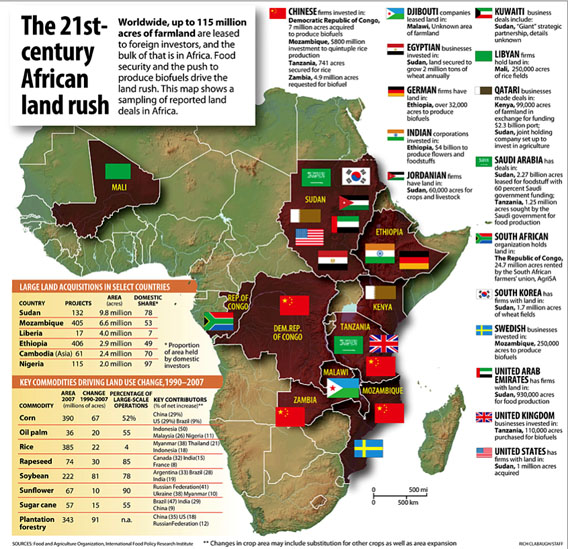
[HOME ] [ABOUT] [PHOTOS] [VIDEO] [BLOG] [HOUSTON] [TEXAS] [U.S. NEWS] [WORLD NEWS] [SPORTS] [POP CULTURE] [CONTACT]
Indigenous people face risk of losing land and natural resources

The map above shows countries that have leased out their farmland to foreign corporations
[+] Click here to enlarge or download map
by Joseph Earnest July 2, 2012
Newscast
Media HOUSTON, Texas—The
2012 report on minorities and indigenous people authored by Minority Rights Group International (MRG)
in London, says indigenous peoples "in
every region of the world" face the risk of being "driven from their
land and losing natural resources."
The report provides a comprehensive and much-needed overview of marginalized groups– both those who have been adversely affected by natural resource exploitation and those who have fought to benefit from these resources. Forests, like most other valuable natural resources, are finite, and their destruction will have global repercussions. But governments continue to focus on short term gains at the expense of long-term sustainability.
Indigenous and minority communities do not reject all natural resource development; rather, they seek methods that respect their rights, that are consensual and from which they can benefit fairly.
The report says some of the poorest minorities and indigenous peoples live in some of the most resource-rich regions of the world; this is true in both the global North and the global South. From the oil- and mineral-rich Aboriginal Australian outback, the lush African descendant coastal areas of Central America and the dense forests of India's tribal peoples, minorities and indigenous peoples have lived in these areas for centuries and even millennia yet have been denied their rightful ownership.
Evictions and involuntary migration are used commonly to get (illegal) access to lands and resources. People are forced to migrate to urban slums where they face further marginalization or to even more remote regions where livelihoods are more difficult.
The views of women are particularly liable to go unconsidered given their lack of representation in many decision-making structures, both traditional and otherwise.
There are particular impacts on minority and indigenous women. Women's burden of work can increase significantly due to increased problems in accessing clean water, fuel and traditional food sources and to men's migration for employment once traditional occupations are no longer viable.
In Colombia, for example, Wayúu women displaced from their traditional lands in La Guajira as a result of coal mining have struggled to feed their families in new urban environments, relying on bread and soft drinks, instead of traditional foodstuffs of fish, plantain, yam and fruit, thus increasing malnutrition in their families.
Women's title to land is not legally recognized in some states and when displaced due to natural resource development projects, they will have little legal recourse for compensation or redress. You may read or download full report here. (pop-up).
|
|
Join the Newscast Media social networks
for current events and multimedia content.
Copyright© Newscast Media. All Rights Reserved. Terms and Privacy Policy